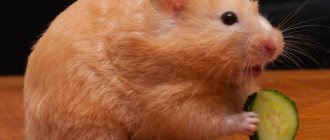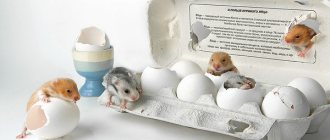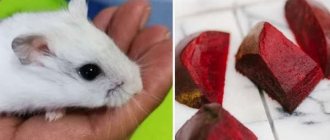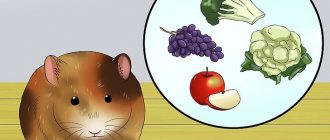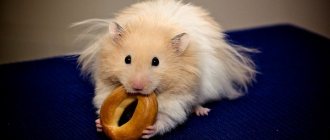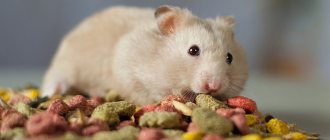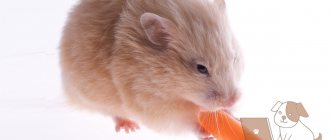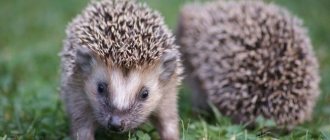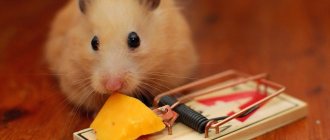When getting a hamster as a pet, you should pay close attention to its diet. You should find out which foods are suitable for a rodent, and which ones are not recommended to be added to the diet. This will help keep the animal healthy and cheerful. Let's figure out whether hamsters can have milk and dairy products. Please note that feeding recommendations may vary depending on the breed of your pet.
Can hamsters have milk and cottage cheese?
When getting a hamster as a pet, you should pay close attention to its diet. You should find out which foods are suitable for a rodent, and which ones are not recommended to be added to the diet. This will help keep the animal healthy and cheerful. Let's figure out whether hamsters can have milk and dairy products. Please note that feeding recommendations may vary depending on the breed of your pet.
Which milk should I give to whom?
Newborn hamsters drink their mother's milk, which gives them the necessary strength and energy for proper growth and development. At a certain age, the need to feed mother's milk disappears. An adult hamster that does not suffer from diseases does not need to add milk to its diet. A store-bought product undergoes special processing and does not contain a large amount of useful substances.
Giving milk to hamsters is recommended in the following cases:
- If the hamster is pregnant or nursing babies. During this period, the small body needs additional support.
- If the baby is left without a mother and needs to be fed. In this case, a special mixture is suitable. A specialist will tell you which mixture is best to use.
- The rodent suffered a serious illness. Milk is given as prescribed by a doctor in certain doses.
Article on the topic: Can hamsters have raw and boiled potatoes?
In these cases, it is recommended to feed the animals with low-fat milk - less than 1.5% fat content. Cow's milk is preferable. It is less fatty than goat. The rodent's body is sensitive to fatty foods. Excessive load on the liver negatively affects the general condition and health of the pet. Lethargy and fatigue appear.
Before feeding your hamster milk, you should boil the liquid and cool it to room temperature. Heat treatment disinfects the milk and helps prevent infection of the creature. Portion sizes and diet are discussed with the veterinarian.
Cottage cheese, sour cream, kefir, yogurt
Before feeding your pet dairy products, you should carefully study the composition. Products with sugar, salt, aromatic and chemical additives are strictly prohibited to be given to rodents. Such substances are not absorbed by the hamster’s body. The pet becomes lethargic, inactive, and falls ill. The internal organs and systems of the hamster suffer. Some additives can cause serious harm to a creature's health.
If the composition of the product is suitable, pay attention to the fat content in it.
It is not recommended to give sour cream to hamsters. The fat content of the product is at least 10%, the pet’s body will not be able to cope with the load.
Kefir is traditionally considered a healthy drink. But rodents should not eat kefir. This product will negatively affect the baby's health. Diarrhea or constipation may occur (depending on the freshness of the kefir).
Due to their high fat content, yoghurts should also be excluded from your hamster's diet. Even natural yoghurts, which do not contain additives harmful to the animal, should not be considered as a supplement. The reaction of the animal's body will be similar.
Hamsters can be given cottage cheese as a protein supplement to their food, following certain rules:
- Use only low-fat cottage cheese.
- Choose the freshest cottage cheese. Poisoning with a stale fermented milk product is fraught with negative consequences.
- It is not recommended to give cottage cheese more than 2-3 times every 4 weeks. The doctor will help you choose the required portion and frequency of feeding.
Article on the topic: What do hamsters eat at home: a list of foods that can and cannot be given to eat
Compliance with these rules will help maintain the health of the hamster and strengthen it with the help of the beneficial properties of cottage cheese.
Ready-made dry food
Brands of food for Djungarian hamsters are distinguished by their diversity. We will look at the most popular ones separately, then we will give some useful tips on choosing the appropriate option.
Description of popular brands
The most popular brands of food for rodents of this breed among breeders are as follows.
This:
- Versele-Laga "Prestige Mini Hamster Nature" is one of the best foods made specifically for this breed of rodents. The diet of the Djungarian hamster must be balanced and the manufacturer has taken this nuance into account. The composition contains fruits, vegetables, proteins, nuts and yeast. If your hamster is overweight, you should choose pineapple with raisins from the food.
- Chika-Bio “Food for Djungarian hamsters” is a domestic analogue, which, contrary to stereotypes, is not inferior in quality to the original. The ratio of ingredients and the size of the pieces are selected specifically for hamsters of this breed. This brand stands out for its reasonable price and good quality.
- JR Farm Hamster is a universal food for hamsters. It stands out for its high taste qualities. Hamsters eat all the food without selecting the most delicious parts. It is also worth mentioning the composition of this product, which contains various sources of protein, the prebiotic inulin, which improves digestion, and yucca extract, which reduces odor.
- Vitapol and Lolo pets. This brand should be stored in a separate glass container with a tight lid, and not in a bag. The mixtures are distinguished by the vastness of their diet, which will have to be diversified only in case of pregnancy, lactation, growth period, or mating time. The animal can live for a long time eating only this food.
- Padovan Grandmix Criceti. Complete food. Vacuum packaging makes it possible to preserve all properties. For a fairly low price, the buyer receives good quality rodent food. The disadvantages include a lack of protein.
How to choose the right one
A hamster is not an exotic animal and there should be no problems finding food. But in any case, you should read the composition before purchasing. Look for a food with the most balanced ratio of ingredients so as not to compensate for the lack of protein with tasty but harmful additives.
As mentioned earlier, food should be the basis of the dzhungarik’s diet. However, additional food outside of the mixture will only benefit. That's why we provide detailed information about what hamsters can and cannot do in the form of a list.
For owners of Syrians and Dzungarians
Djungarian hamsters can be given milk in the cases described above. Do not feed your pet dairy products unless necessary or recommended by a doctor. Because babies' bodies are delicate and sensitive. Cottage cheese can be given to Djungarian hamsters no more than once every 10 days.
Despite the differences between Syrians and Djungarians, dairy and fermented milk products will also not benefit Syrian hamsters if they are overfed for no apparent reason. Give the Syrians dairy products, like the Djungarians, as needed. Monitor your pet's condition while feeding.
Cheese
It is also not recommended to feed your hamster cheese, since the hard varieties are made with salt and spices, while the soft ones have a viscous consistency and can stick in the pet’s cheek pouches, which in turn can lead to serious consequences. Read more about whether hamsters can eat cheese here.
For your pet to live a long and happy life, you need to feed it properly. Therefore, you should not feed your rodent everything, including dairy products. We hope that you now know whether hamsters can have milk, cottage cheese, yogurt, kefir and cheese, as well as when and how often you can feed your pet dairy products.
Did you like the article? Share with friends: [supsystic-social-sharing id=”1"]
- Related Posts
- Can hamsters have raisins?
- Can hamsters have strawberries?
- Can hamsters eat cucumbers?
« Previous entry
What other dairy products should you feed?
Occasionally, you can add low-fat cheese without impurities and salt to your pet’s diet. Check with your doctor before giving your pet a new treat. It is not recommended to give other dairy or fermented milk products. You should not cook porridge with milk, as the digestion process will be difficult. The animal’s body is not adapted to such food.
Before adding new products to your pet’s diet, carefully read the ingredients of the product and consult with your veterinarian. Not all foods that are healthy for humans can be given to hamsters. When making changes to your animal's diet, monitor its well-being. This will help prevent the negative consequences of poor nutrition and understand what is not suitable for your pet.
Article on the topic: What vegetables and fruits can be given to hamsters
Proper pet care
When planning to purchase individuals of the hamster family, you should first think about whether following the rules of care, which include such points as:
- washing the cage, feeder, drinking bowl without disturbing the usual arrangement of objects in the pet’s home on a weekly basis;
- changing bedding, cleaning bins of spoiled food weekly;
- daily toilet care;
- creating comfortable, stable conditions without disturbing them.
It is extremely important not to disturb the animal’s way of life, determined by it after moving into the cage. Otherwise, the animal receives too much nervous stress, experiences stress and dies a sudden death. It is not recommended to move the rodent’s home from place to place, or to let it out of its designated living space. To satisfy your baby's physical activity, it is enough to install a running wheel.
You can give milk if you are careful
As a rule, animals like milk. But, like other dairy products, it should be given rarely. They give it as a delicacy, maybe once a week or a little less often. Milk can and should be given to a hamster after certain illnesses for adaptation. If the hamster is pregnant, then it needs to be fed milk more often. Because the body gives off a lot of energy and requires constant renewal. You can also continue to give while feeding the offspring. When the rodent has become a mother, you can give 4-5 grams of dissolved milk powder in the first 3 weeks. Powdered milk is easily digested by hamsters, including young ones. Hamsters can also eat cheese if it is not salty.
Can hamsters have milk? You can, but it’s better to feed him cottage cheese. Whole milk, if given, is given very rarely. If you still want to pamper your pet with milk, then adhere to the following rules:
- Do not neglect the fact that a hamster can drink milk. It does not need to be given often. Preferably once a week or less.
- Before giving this dairy product to your rodent, you need to boil it for better absorption. This way it will become more secure.
- Don't give goat's milk. Its fat content is even higher than that of a similar product from a cow.
Article on the topic: What to feed a Djungarian hamster at home, what Djungarian hamsters eat, nutrition table (list: do’s and don’ts)
What are the benefits of milk
What do we even know about him? White, tasty, healthy. If you drink a lot of cold things, your throat will hurt. In addition, this natural product contains:
- calcium;
- magnesium;
- phosphorus;
- other elements for the correct and harmonious development of a young body.
There is no doubt about the benefits of this product for humans, but does this apply to hamsters? Before answering this question, I would like to cite one interesting fact :
Among all mammals, only humans, as adults, are able to drink milk without harm to their health thanks to a mutation that occurred several thousand years ago.
I very much suspect that now all cat owners will snort indignantly and will be partly right, but only partly. Cats, no matter how strange it may sound, should not be fed natural milk all the time either. Well, they don’t produce lactose to digest milk sugar. If you don’t believe me, read the information on specialized cat websites.
How to feed milk to a hamster
Unfortunately, it happens that the animal dies or for other reasons is not able to continue feeding its offspring milk. Can hamsters who are not even a month old have milk? I will say more - it is necessary. Without it, he will die anyway, since he is not yet able to eat solid food. Not every dairy product is suitable for this purpose. You need to buy baby formula and a syringe. You can also use a pipette instead of a syringe. You will have to feed these little ones by hand. To do this, we gradually and wisely give them this milk from a pipette or syringe. Be very careful as they may choke. Feed every 2 hours, just like baby rabbits. Milk is okay, but can a hamster have watermelon?
Thus, hamsters can be given milk about once a week . During pregnancy and feeding offspring, it is necessary to replenish the animal’s nutrients and proteins more often. And if you need to feed newborn hamsters, then you simply cannot do without baby formula.
Any questions left?! Find all the answers in the search:
Can hamsters have milk, cottage cheese, yogurt and other dairy products?
Most often, when buying a first hamster, its owners do not know at all what to feed this animal. And they begin to offer the rodent everything, naively believing that a small amount of different food will do nothing for it. And if he eats with pleasure, then that’s good, because a domestic hamster should have instinct, like his wild counterparts. But this is not true at all. After all, most of the food that a person eats cannot be absorbed by the rodent’s digestive system, and this leads to sad consequences. Hamsters are tiny animals and, like any child, they want to be fed milk or dairy products. Is it worth doing this? In our article we will look in detail at whether hamsters can eat cottage cheese, kefir, yogurt and other dairy products.
Article on the topic: Types and breeds of chinchillas with photographs and names of different colors
Before offering any dairy products to your pet, check the ingredients for sugar, salt, stabilizers, flavorings and other additives. Feeding such foods can cause diseases in the hamster, primarily from the gastrointestinal tract, because the delicate digestive system of a rodent cannot digest foods that are unnatural for itself. In addition, pay attention to the fat content of the product. The fat content of milk and dairy products should not exceed 1.5%. Fatty foods are poorly absorbed by the rodent's body and lead to digestive problems.
Interesting Facts
Djungarian hamsters were domesticated only in the middle of the twentieth century. Rodents of this breed feel comfortable in an apartment and get along well with people.
A few facts will help you better understand these animals:
- Rodents' teeth grow throughout their lives, so they need mineral stones to grind them down. Too large incisors can damage the animal's delicate cheeks.
- Rodents of this breed do not hibernate in winter, but in severe frosts they become numb for several hours. This condition may mean that the animal is stressed or lacking oxygen.
- At temperatures below +16°C, hamsters shed. In winter, their gray color becomes lighter.
- They are capable of traveling several tens of kilometers during the night. In the wild, hamsters divide territory and, if invaded, fiercely defend their home, so it is not worth putting 2 animals in a cage. They do well alone.
- Pregnancy in these rodents lasts for 25 days. From 1 to 11 cubs are born.
- The Djungarian hamster is a dwarf breed, individuals reach 10 cm in length and weigh from 30 to 65 g. The animals are distinguished by smooth fur and a dark stripe along the body, which most individuals have.
- Rodents of this breed quickly get used to humans, but taming should be gradual.
Milk
Milk is the first food of every mammal's baby. It contains all the necessary components for the child to grow and develop properly. Hamsters also drink their mother's milk from birth until they switch to feeding on their own and there is no need for mother's milk. Under natural conditions, a rodent consumes milk only from its mother, while adults do not consume it and remarkably replenish the need for fluid in the body with ordinary water.
Can hamsters have milk? Since this is an unnatural product for an adult animal, it is not worth offering it.
You can give milk to hamsters in several cases:
- The female who gave birth died, and her newborn babies are not able to feed on their own;
- A pregnant or lactating female is weakened and needs additional feeding;
- The hamster is weakened due to a serious illness and can only eat liquid food.
What kind of milk can be given to hamsters?
If you decide to offer your pet this product, then pay attention to the following points:
- Milk should be low-fat, it is best to use a product with a fat content of no more than 1.5% fat;
- Choose cow's milk over goat's milk, as goat's milk is much fattier;
- Be sure to boil the milk and cool before feeding;
- Use dissolved milk powder, it is easier for rodents to digest;
- Before feeding milk for the first time, be sure to consult your veterinarian.
Article on the topic: Can hamsters have fresh cucumbers, at what age and how often?
Such a product is not given to a healthy animal or is offered in very rare cases, since it will not benefit the hamster, but problems with the gastrointestinal tract are more likely. Read more about feeding hamsters milk in this article.
Cottage cheese
Whether hamsters can have cottage cheese is also a concern for owners of furry pets. Cottage cheese is a protein product that is easily and quickly absorbed by the body. But it should not be abused either.
You can offer your rodent a small amount of this complementary food, following these recommendations:
- To feed your pets, use a low-fat product;
- Feed cottage cheese no more than once a week, alternating with other protein supplements - boiled meat and boiled eggs;
- Buy only fresh dairy products and only from trusted sellers.
Feeding stale cottage cheese or other dairy products can lead to severe poisoning, so check them carefully.
If you follow these recommendations, your pet will receive all the necessary nutrients from the cottage cheese, and the gastrointestinal tract will not be affected.
Yogurt
But can hamsters have yogurt? If you want to offer your pet yogurt, then choose a low-fat (no more than 1%) product without additives and sugar or bifilin. It's best if you make yogurt yourself and feed it to your rodent. Only this product should not be fed to the hamster often; 3-4 times a month is enough.
To make yogurt tastier, use fruits from the approved list, such as apples. Cut a small piece of fruit or mash it and mix it with a teaspoon of natural yogurt. Your hamster's treat is ready!
Completely prohibited
Do not give dzungaria under any circumstances. If you break the ban, it will lead to the death of your pet.
Prohibited products:
- pasta and other flour products;
- legumes;
- almond;
- Brazilian nut;
- Pine nuts;
- apricot and cherry pits;
- chestnuts;
- acorns;
- melon;
- watermelon;
- potato;
- onion;
- cabbage;
- garlic;
- citruses;
- Exotic fruits;
- persimmon;
- elder;
- honeysuckle;
- branches of coniferous trees;
- sorrel;
- raw meat;
- sausage, frankfurters;
- cheese;
- milk;
- mushrooms.
